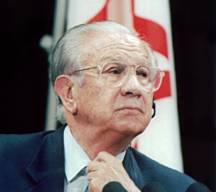|
 The Olympic Games provide a unique platform on which governments
can use to make a political stand. Over the years many countries
have refused to participate for political reasons in the
form of organised boycotts. These boycotts have often tended
to overshadow the events of the games them selves, not only
through increased publicity, but through the unfair competition
that results from having few countries represented at the
games. These boycotts can be seen throughout the modern Olympic
Games. The Olympic Games provide a unique platform on which governments
can use to make a political stand. Over the years many countries
have refused to participate for political reasons in the
form of organised boycotts. These boycotts have often tended
to overshadow the events of the games them selves, not only
through increased publicity, but through the unfair competition
that results from having few countries represented at the
games. These boycotts can be seen throughout the modern Olympic
Games.
In 1964, the IOC banned South Africa from the Olympic Games
in Tokyo over its policy on racial segregation. This ban
continued right up until 1992, following the abolition of
apartheid in South Africa. In 1976, just before the summer
games in Montreal, 32 African countries refused to participate.
The dispute was over the IOC decision to permit New Zealand
to participate in the Games. At the time, the New Zealand
Rugby team were touring racially segregated South Africa.
The IOC chose not to intervene as Rugby is not an Olympic
sport so they were not in a position to react to the tour.
Many felt that a diplomatic compromise could have been reached,
but the IOC did not participate in talks. Taiwan also refused
to participate; this was due to the Canadian government refusing
to allow it to compete as the Republic of China. In this
case Canada is thought to have violated the host city contract
of being impartial in political matters and the IOC was unable
to intervene.
The Soviet Union invaded Afghanistan in December 1979, the
year before the Olympics in Moscow. In response to the soviet
invasion, US president Jimmy Carter gave an ultimatum. On
January the 20th he declared that if the Soviet army did
not withdraw from Afghanistan then the US would not send
a team to the Moscow games. Other western governments also
followed suit. The result was that all national Olympic committees
(NOC s) were put under great pressure from their own governments
not to submit teams. The UK NOC voted to submit a team despite
the influence of Margaret Thatcher, the British government
was able only to restrict the use of the British flag at
the games. In total 65 NOCs refused to take part, although
it is suspected that some smaller countries declared a boycott
in the hope of receiving aid and support from the US.
In retaliation for the previous boycott, the Soviet Union
and 13 communist allies did not participate in the 1984 Los
Angeles games. Romania was the only Warsaw pact country to
send a team to the games. This lead to largely unbalanced
games where the US teams dominated the athletics without
the Eastern European competition.
Before the 1988 games were awarded to Seoul, South Korea,
the IOC spent a long time negotiating the bid. It was proposed
that North Korea and South Korea unite in hosting the games;
this would have been a historic event, as the IOC's normal
policy is to award the games to one host country only. Internal
reports show that the IOC never expected a Korean co-host
bid to work out, but nevertheless they conducted the negotiations
as well as they could. The reasons given in communication
that the talks would not end satisfactory were that North
Korea would not live up to the "tenets" and ideals
of a host country as well as problems with transport across
the border and distributing the events between the countries.
After the negotiations broke down, North Korea refused to
participate, with Cuba and Ethiopia supporting North Korean
by boycotting also.
After the games in Seoul, the Soviet Union collapsed and
communist reign ended in Eastern Europe. This reduced the
amount of influence the cold war and subsequent boycotts
had on the games. For the first time in 20 years all nations
were represented in the Barcelona games in 1992. South Africa
returned as well as North Korea and Cuba participating. 1992
also saw a reunified Germany competing under 1 flag, and
the 12 countries of the Soviet Union submitting one team.
In recent years there has been little political controversy
surrounding the games. Subsequent host cities (Barcelona,
Atlanta, Sydney, Athens) have been relatively stable over
tame. The choice of these 'safer' bid cities has often been
interpreted as the IOC shying away from political; controversy.
However, the IOC has chosen Beijing to host the 2008 games.
During negotiations over the Korean bid, the IOC developed
a well-trained negotiation team, as well as devoting time
and resources in training its staff in international politics.
The result is that the IOC is well equipped to deal with
future political negotiations surrounding the games, and
is most likely to take a more active role in international
politics. This means that in the future, we will see more
of the IOC becoming a powerful political force, particularly
with it's involvement with the UN and the Olympic truce.
|


